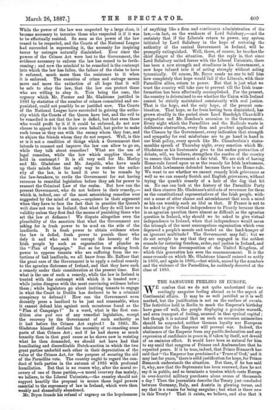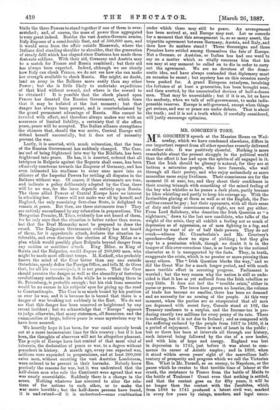THE SANGUINE FEELING IN EUROPE.
WE confess that we do not quite understand the ex- ceedingly sanguine feeling abroad as to the aspect of Continental affairs. It may be as well justified as it is well marked, but the justification is not on the surface of events. The festivities held in Berlin to mark the Emperor's birthday have gone off well, the people displaying a genuine warmth, and even transport of feeling, unusual in that cynical capital ; but though it is natural that on such an occasion animosities should be suspended, neither German loyalty nor European admiration for the Emperor will prevent war. Indeed, the abstinence of the Emperor from any pacific declaration and any expression of confidence in peace is, if taken by itself, not devoid of an ominous effect. It would have been so natural for him to say amid that congress of Princes and Ambassadors that he expected peace. If it be true, indeed, that Prince Bismarck has said that " the Emperor has proclaimed a' Trace of God,' and it may last for years," there is solid justification for hope, for Prince Bismarck understands the situation. But then, if he has said it, why, now that the Septennate has been renewed, does he not say it in public, and so terminate a tension which costs Europe in over-hurried military purchases alone scores of thousands a day ? Then the journalists describe the Treaty just concluded between Germany, Italy, and Austria in glowing terms, and say that is a reason for being sanguine ; but what is there new in this Treaty? That it exists, we believe, and also that it bittds the three Powers to stand together if one of them is over- matched ; and, of course, the mass of power thus aggregated is very great indeed. Besides the vast Anstro-German armies, Italy disposes of a considerable fleet, and of 500,000 men, and it would seem from the affair outside Massowab, where the Italians died standing shoulder to shoulder, that the generation of steady drill which has elapsed since Oustozza has made them first-rate soldiers. With their aid, Germany and Austria may be a match for France and Russia combined ; but their aid has always been expected. Indeed, although we see clearly how Italy can check France, we do not see how she can make her strength available to check Russia. She might, no doubt, land an army in the Balkans more easily than any other Power ; but she is little likely to undertake expeditions of that kind without reward, and where is the reward to be obtained ? It is possible that the check placed upon France has daunted the Russian Government, which fears that it may be isolated at the last moment ; but that danger has always been present, and is counterbalanced by the grand permanent advantage of Russia. She cannot be invaded with effect., and therefore always makes war with an assurance of limited liability, a certainty that if she offers peace, peace will be accepted. The Italian alliance strengthens the chances that, should the war arrive, Central Europe will defend herself successfully, but it does not of necessity prevent the war.
Lastly, it is asserted, with much reiteration, that the tone of the Russian Government has suddenly changed. The Czar, instead of being frightened into war by the Nihilists, has been frightened into peace. He has, it is asserted, ordered that all intrigues in Bulgaria against the Regents shall cease, has been effusively courteous towards the Emperor of Germany, and has even intimated his readiness to enter once more into an alliance of the Imperial Powers for settling all disputes in the Balkans without war. Of course, if those statements are true, and indicate a policy deliberately adopted by the Czar, there Will be no war, for the issue depends entirely upon Russia. The three allied Powers of Central Europe have no interest in attacking her. France will not make war all by herself, and England, the only remaining first-class State, is delighted to remain at peace. But then, are these statements true? They are entirely unconfirmed by any relaxation in preparations. The Hungarian Premier, M. Tisza, evidently has not heard of them, for he only says that the situation is better rather than worse, but that the Dual Monarchy must be prepared to draw the sword. The Bulgarian Government evidently has not heard of them, for it apprehends attack, declares the situation in- tolerable, and even discusses the election of King Milan as a plan which would possibly place Bulgaria beyond danger from any sudden or maritime attack. King Milan, as King of Servia and the Bulgarias, would dispose of 200,000 men, who might be made most efficient troops. M. Katkoff, who probably knows the mind of the Czar better than any one outside Gatschina, openly defies the Foreign Office, and tells M. de Glen that, for all his communiques, it is not peace. That the Czar should perceive the danger as well as the absurdity of fostering revolutionary outbreaks in Sofia while he is crushing them in St. Petersburg, is probable enough ; but his risk from assassins would be no excuse in his subjects' eyes for giving up the road to Constantinople. The Czar is as much bound by his position as ever he was, and it is because he is bound that there is a danger of war breaking out suddenly in the East. We do not see that this danger has been removed or heightened by any recent incident ; but we acknowledge that "Europe" appears to judge otherwise, that many statesmen, all financiers, and the communities at large, believe peace in some mysterious way to have been assured.
We heartily hope it has been, for war could scarcely break out at a more inconvenient time for this country ; but if it has been, the thoughts of observers will not be altogether pleasant. The people of Europe have lost control of that most vital of interests, the declaration of peace or war, to a degree without precedent in history. A month ago, every one expected war, millions were expended in preparations, and at least 200,000 extra men, without counting the vast Austrian Landsturm, ware ordered to be present in their barracks. Nobody knew precisely the reasons for war, but it was understood that the 11111f-dozen men who rule the Continent were agreed that war was nearly unavoidable. Suddenly there is a change in the scene. Nothing whatever has occurred to alter the rela- tions of the nations to each other, or to make the war more horrible ; but the half-dozen persons have found, it is unclustood—if it is understood—some combination under which there may still be peace. An arrangement has been arrived at, and Europe may rest. Let us concede for a moment that this arrangement is, as so many assert, the tripartite agreement between Germany, Austria, and Italy, and then how do matters stand ? Three Sovereigns and three Premiers have settled among themselves the fate of Europe. Not a German, or Austrian, or Italian has had one word to say on a matter which as vitally concerns him that his son may at any moment be called on to die in order to carry out the agreement. We are no devotees of the demo- cratic idea, and have always contended that diplomacy must on occasion be secret ; but mystery has on this occasion surely been pushed far. A grand European cataclysm, involving the fortunes of at least a generation, has been brought near, and then averted, by the uncontrolled devices of half-a-dozen men. That may be unavoidable ; but if it is so, let us have the modesty, when we talk of self-government, to make indis- pensable reserves. Europe is self-governed, except when things get serious, and war or peace are under debate. That is about the truth ; and it is not a truth which, if carefully considered, will justly encourage optimism.















































 Previous page
Previous page